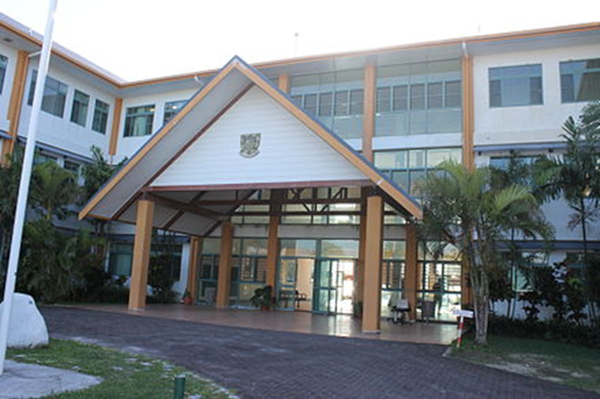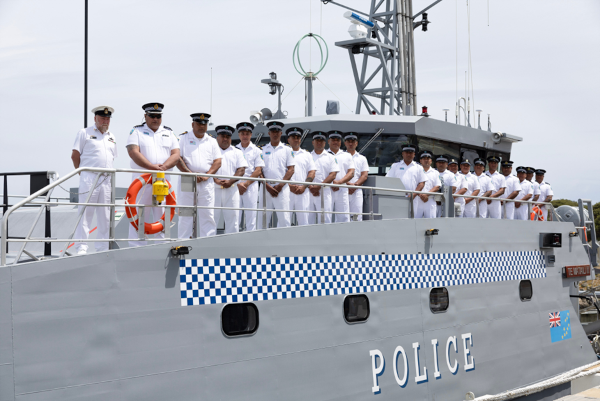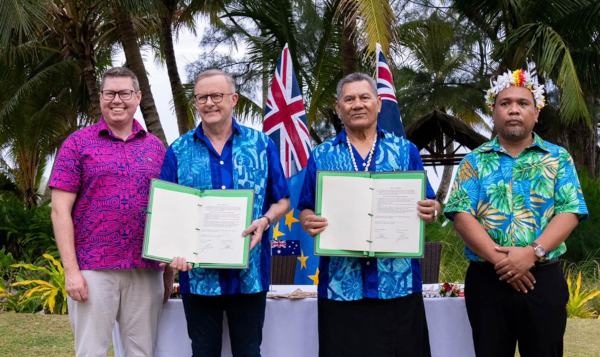Facts and figures
| Government type | Unitary parliamentary constitutional monarchy |
The ‘Know Your Region’ series is designed to support unit and individual professional military education on the Indo-Pacific region. It’s important for all serving members of our military to have a foundational knowledge of the countries and issues in the Indo-Pacific.
On this page:
- A Short History
- Tuvalu Politics
- Rule of Law
- Migration Policy
- International Diplomacy
- Australia
- New Zealand
- Taiwan and China
- International Fora
A Short History
Long before European contact, the Tuvalu islands were settled by Polynesian voyagers. Political life centred on kinship groups and village-level authorities. Chiefs and elder councils (the falekaupule) resolved disputes, organised communal labour, and managed access to land and resources.
European contact accelerated across the Pacific during the 19th century. The Ellice Islands (the colonial name for Tuvalu) was declared a British protectorate in 1892 and then a British colony from 1916 as part of the Gilbert and Ellice Islands colony. British administration, missionaries, and new legal frameworks reshaped local governance, law, and social customs.
After World War II, decolonisation movements gained momentum across the globe. UN Resolution 1514 (1960) – the Declaration on the Granting of Independence to Colonial Countries and Peoples – put moral and political pressure on European powers to grant self-determination to their colonies. By the 1960s, both the Gilbert and Ellice Islanders were developing political aspirations. However, the Ellice Islanders increasingly believed that the central colonial administration in Tarawa (in the Gilbert Islands) neglected their interests. In the early 1970s, Tuvaluan leaders began to campaign formally for separation from the Gilbert Islands. Tuvalu achieved independence as a constitutional monarchy within the Commonwealth on 1 October 1978.
Tuvalu Politics
Tuvalu is a parliamentary-representative democratic constitutional monarchy. The British monarch is Tuvalu’s head of state and is represented locally by a Governor-General appointed on the advice of Tuvalu’s Prime Minister. Executive power is exercised by the Prime Minister and Cabinet, drawn from members of the unicameral Parliament (Palamene o Tuvalu). The Constitution of Tuvalu, originally adopted at independence, has been amended through domestic constitutional review processes.

Tuvalu’s Parliament Chamber – Wikipedia
Tuvalu’s parliament has around 15 members plus the Speaker. MPs represent multi-member or single-member constituencies corresponding to the islands. Candidates run as independents and form governing coalitions after the vote. The Prime Minister’s tenure depends on maintaining the confidence of a majority of MPs; hence alliances and island loyalties are important. Because of the small size of parliament, single seat changes can produce government turnover, which has implications for policy continuity and diplomacy.
At the island level, the falekaupule (traditional assembly) plays an official role in local government. Local assemblies manage community affairs, land management, and customary mandates while coordinating with national ministries on service delivery and development projects.
The rule of law
Tuvalu’s legal system blends English common law with local statutes and customary law. The judiciary includes inferior courts on the islands and a High Court. Appeals historically could proceed to the judicial committee of the Privy Council in London, although regional appellate arrangements have also been used.
Impact of Climate Change
Over recent decades, climate change has risen from a secondary issue to the defining foreign-policy and national-security concern for Tuvaluan leaders. The shift has profoundly altered Tuvalu’s diplomatic strategy and legal posture.
In 2023–2024, Tuvalu’s parliament passed changes to the Constitution establishing that the State of Tuvalu persists “notwithstanding the impacts of climate change or other causes resulting in loss to the physical territory of Tuvalu.” This reform is intended to secure Tuvalu’s legal existence, rights, and international personality even in a worst-case scenario.
Migration Policy
Migration policy is central to Tuvaluan planning because of climate risk. The country has negotiated mobility and labour pathways with partners (for example the Australia-Tuvalu Falepili Mobility Pathway and seasonal worker schemes with New Zealand) and explored options for preserving citizenship rights for dispersed populations. Any large-scale migration raises complex questions about nationality, property, and cultural continuity and has been a major topic of debate.
International Diplomacy
Tuvalu leverages its sovereign equality in global forums to punch above its weight on a handful of existentially important policy fronts – climate diplomacy, maritime rights, development partnerships, and regional security cooperation.
Australia
Australia is Tuvalu’s most important bilateral partner for development and security. Canberra provides substantial development assistance, supports policing and maritime capability (including Guardian-class patrol boats), and funds adaptation projects and emergency response capacity.

Twenty-first Guardian-class Patrol Boat (GPB) delivered under the Pacific Maritime Security Program (2024) – Defence Images
The Australia-Tuvalu Falepili Union Treaty was signed on 9 November 2023 and entered into force on 28 August 2024. The agreement focuses on areas such as climate cooperation, development, and shared security. It also includes provisions for a migration pathway, allowing up to 280 Tuvaluan citizens to live, work, or study in Australia each year.
The Falepili Union includes an Australian investment of over $110 million for Tuvalu’s national priority projects and a commitment to climate action, including $47 million in development assistance to be delivered between 2025 and 2026. Australian funding has also spearheaded components of the Tuvalu Coastal Adaptation Project (TACAP) which aims to improve coastal protection in key locations on the islands of Funafuti, Nanumea and Nanumaga.

Falepili Union signed by Australian Prime Minister Anthony Albanese and Tuvalu Prime Minister Kausea Natano on 10 November 2023 – Dev Policy Blog, Australian National University
New Zealand
New Zealand is home to the largest Tuvaluan diaspora and is a crucial partner for both labour mobility and social linkages. The relationship has provided much needed remittance through employment and education/training opportunities. New Zealand also supports Tuvalu through development assistance in health, education, and climate adaptation.
China and Taiwan
Tuvalu is one of several Pacific states that maintains formal diplomatic recognition of Taiwan (the Republic of China) in favour of the Peoples Republic of China (PRC). This relationship has produced bilateral development assistance, scholarships, high-tech early warning systems, and green energy infrastructure. In return, Tuvalu voices its support for Taiwan in international forums where Taiwan is excluded, particularly in the United Nations (UN) and Pacific Islands Forum (PIF). Taiwanese President Lai Ching-te visited Tuvalu in December 2024. Statements from both sides indicate mutual appreciation and continued cooperation.
Tuvalu’s support for Taiwan has endured despite economic incentives to switch diplomatic recognition, as observed in Solomon Islands, Nauru, and Kiribati. In 2019 Tuvalu rejected a $400 million project from China to build artificial islands to aid with climate change.
International Forums
Tuvalu is a member of many regional and international bodies, including the UN, the Pacific Islands Forum PIF, the Pacific Community, the World Trade Organisation (WTO), the International Monetary Fund (IMF), and the World Bank.
At the UN General Assembly and the annual Conference of Parties (UNFCCC COP) Tuvalu has campaigned for global mitigation, adaptation finance, loss and damage mechanisms, and a legal recognition of at-risk states. Tuvalu’s leadership have been particularly outspoken on the threat of climate change; for example, Tuvalu’s then-Foreign Minister the Honourable Simon Kofe MP famously recorded a speech for the United Nations’ COP climate conference standing knee-deep in seawater.
Tuvalu engages with Pacific leaders on regional issues such as maritime security, fisheries, climate, security, economic development and political solidarity through the PIF and Pacific Community.
In trade and economic diplomacy, Tuvalu uses its sovereign instruments (including the .tv internet domain) and international law claims (notably UNCLOS maritime entitlements) to advance economic interests and maintain a voice disproportionate to its size.
For more information on Tuvalu diplomacy, see the resources below:
Videos
- Preserving Tuvalu—the first digitized nation—in the metaverse
- Tuvalu: a tiny nation taking on Australia and the world to fight climate change | The World
- President Lai sits with Tuvalu PM, signs partnership communique|Taiwan News
Articles
- Tuvalu's 2024 general election: a new political landscape - Devpolicy Blog from the Development Policy Centre
- Tuvalu Constitution updated: culture, climate change and decolonisation - Devpolicy Blog from the Development Policy Centre
- australia-tuvalu-development-partnership-plan-2025-20230.docx
- Australia’s development partnership with Tuvalu | Australian Government Department of Foreign Affairs and Trade
- Entry into force of historic Australia-Tuvalu Falepili Union | Prime Minister of Australia
- Australia must stay engaged during Pacific island countries’ political instability and change | The Strategist
- Friends to all: Falepili Union Treaty sets Tuvalu’s security, Australia must deliver | The Strategist
- Tuvalu | New Zealand Ministry of Foreign Affairs and Trade
- Taiwan, Tuvalu sign agreements on labor cooperation - Taipei Times
- The Pacific Islands Forum
- The Pacific Community
Know your region
Know Your Region series gives you a shortcut to understanding other nations in the Indo-Pacific region.









